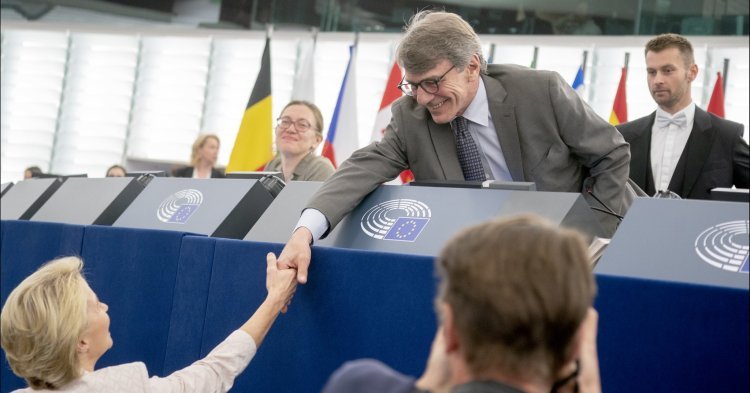After a narrow election, the complex task of forming the college of Commissioners
Exit the Spitzenkandidaten system. Ursula von der Leyen, the German Defence Minister almost unknown by the citizens, was proposed by the European Council for the Commission presidency. She was eventually narrowly elected by the European Parliament. The parliamentary majority was set at 374 votes, and von der Leyen was elected with 383 in her favour, 327 against, and 22 abstentions.
These results are already a weakness: almost half of the MEPs voted against the new President. Moreover, although the votes were by secret ballots, some political groups and MEPs revealed their choice, showing that some Eurosceptic parties voted for von der Leyen, including Law and Justice (Poland) and the Five Star Movement (Italy). The latter boasted about their “determining votes” allowing von der Leyen to reach the required parliamentary majority.
Even if the EPP, the S&D and the Renew Europe groups had officially stated that they would support von der Leyen, the number of votes in her favour shows that at least 100 MEPs from these groups voted against her. The divisions between the different national parties forming the S&D, for example, suggest that the social democratic group was far from voting unanimously. The Greens voted against von der Leyen as a bloc, considering, among other things, that her commitments on the rule of law and immigration were not satisfying, and regretting the absence of agricultural policy in her programme.
The most urgent task for von der Leyen is now to form her college of Commissioners, based on the candidates proposed by the member states. The Spitzenkandidaten Frans Timmermans and Margrethe Vestager are foreseen as Vice-Presidents. Poland, the Czech Republic, Slovakia and Lithuania would all be interested in the energy portfolio. France is willing to keep an important economic and financial portfolio (following on from Pierre Moscovici and Michel Barnier). A difficulty will also be to reach a gender balance, as several member states have so far only proposed men. The hearings at the European Parliament of the Commissioners chosen by Von Der Leyen should take place between the 30th of September and the 8th of October, and the new Commission should be elected by the Parliament between the 21st and 24th of October.
Moreover, one of the conditions for France and other member states to support the candidacy of Ursula von der Leyen was the resignation of Martin Selmayr, who had been rapidly promoted Secretary General of the Commission by Jean-Claude Juncker in opaque circumstances, prompting a rebuke from the European Ombudsman. Last week, Martin Selmayr indeed announced he is stepping down, and France is now eyeing the position, with two current French Directors-General rumoured for the job.
New equilibriums at the European Parliament
David Sassoli from the Italian Democratic Party was elected President of the European Parliament. After Antonio Tajani, Italy thus keeps the Parliament presidency, but the choice of a social democrat is like a cold shower for the country’s far-right interior minister Matteo Salvini.
The 14 European Parliament Vice-Presidents, for their part, reflect the “grand coalition” formed by the EPP, the S&D, Renew Europe and the Greens, as well as the chairs of the parliamentary committees. A member of the United Left and a non-attached member also feature among the vice-presidents, but the conservatives and the far-right have been ruled out, as were... the French.
The latter, however, are more fortunate with committee chairpersonships, with three French Chairs in total. The environment, transport and regional development committees will be chaired by French MEPs. The former President of the European Parliament, Antonio Tajani, is the new chair of the AFCO committee.
Western Europe dominates the top jobs
The other top jobs were allocated at the European Council summit in early July. Charles Michel, the liberal Belgian Prime Minister, will be the new President of the European Council, and the Spaniard Josep Borrell, former President of the European Parliament, will succeed Federica Mogherini as the High Representative of the Union for Foreign Affairs and Security Policy.
Christine Lagarde will finally take the lead of the European Central Bank, from the 1st of November onwards. Among her foreseen successors at the International Monetary Fund are Pierre Moscovici (now European Commissioner for Economic and Financial Affairs, Taxation and Customs) Mark Carney (Governor of the Bank of England), Olli Rehn (Governor of the Bank of Finland), and Kristalina Georgieva (World Bank Chief Executive).
A German Commission President, an Italian Parliament President, a Belgian European Council President, a Spanish High Representative and a French ECB President... If Donald Tusk, a Pole, was the European Council President for the previous term, this time the top jobs did not go beyond the former Iron Curtain.
However, the balance could be improved a little thanks to two other positions, less mediatised. David Sassoli reiterated the European Parliament’s support for the Romanian Laura Codruţa Kövesi as head of the new European Public Prosecutor’s office, as did France who had earlier presented a candidate. Moreover, the Estonian Julia Laffranque announced her candidacy to succeed Emily O’Reilly as the European Ombudsman.


Follow the comments: |
|
